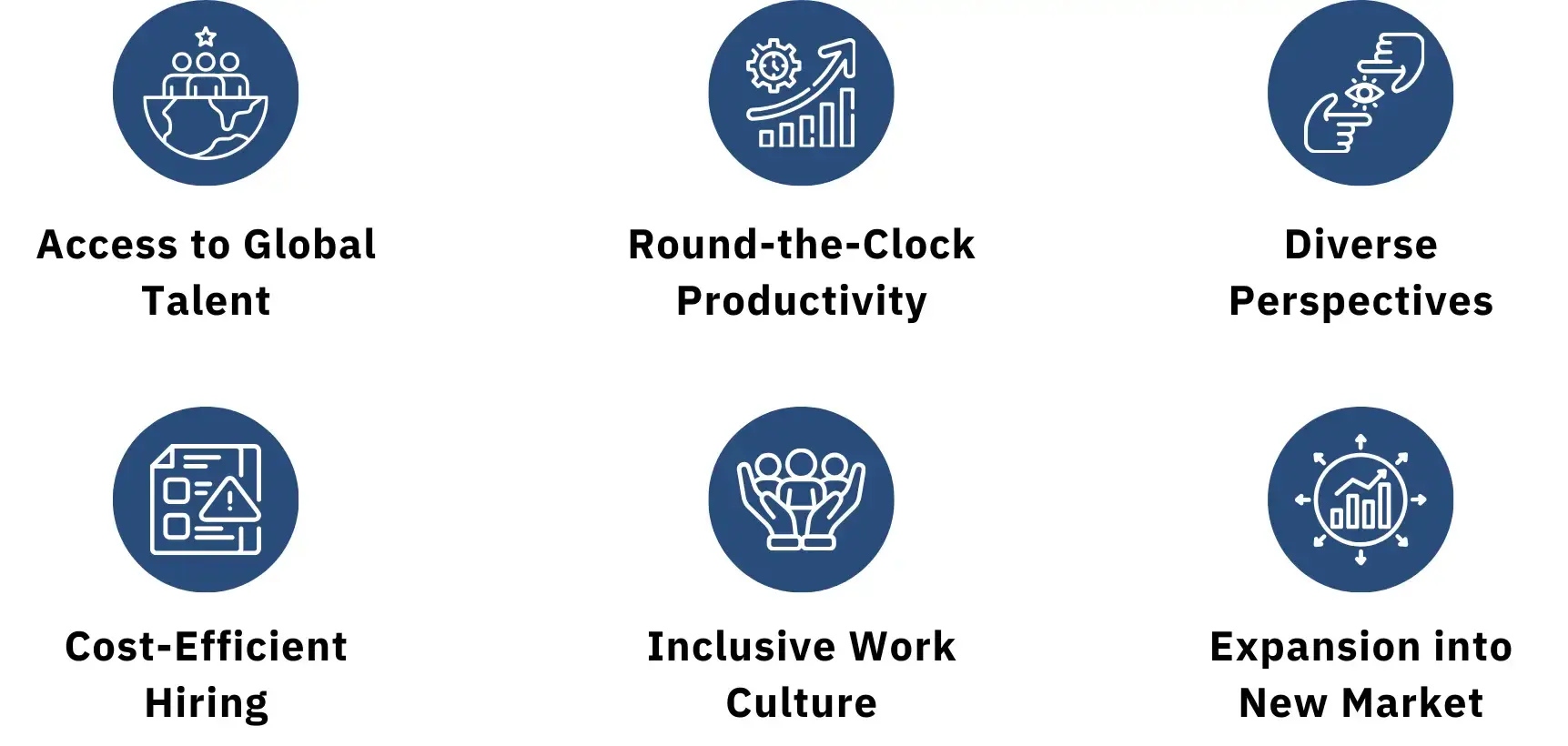11 Ways of Managing a Global Team Successfully

In today’s global economy, the workplace extends well beyond traditional boundaries. Organisations operate across time zones, legal systems, and cultures, enabling access to global talent while introducing complex managerial challenges. Leading cross-border teams requires more than conventional leadership; it calls for regulatory fluency, operational discipline, and cultural intelligence.
This article outlines eleven proven strategies for managing multinational teams, designed to enhance efficiency, promote cohesion, and unlock the full potential of a diverse, globally dispersed workforce.
Get our quick guide on: How Workforce Expansion Efficiencies Are Able to Help Companies Drive Business Growth
Table Of Content
- The Strategic Importance of Workforce Management for Global Teams
- Key Organisational Benefits of a Well-Managed Global Team
- 11 Proven Approaches to Managing a Global Team with Employer of Record (EOR) Expertise
- Streamline Onboarding with EOR Expertise
- Build a Global Communication Infrastructure
- Align Global Teams Around Shared Goals and KPI
- Prioritise Cultural Awareness and Local Inclusion
- Build Trust in Remote and Hybrid Teams
- Select Integrated Digital Collaboration Tools
- Coordinate Time Zones and Workflows Intelligently
- Ensure Employer Compliance Across Jurisdictions
- Recognise Talent and Tailor Motivation Strategies
- Lead with Empathy Backed by Operational Clarity
- Adapt Processes to Evolving Workforce Needs
- Conclusion
- Frequently Asked Questions
The Strategic Importance of Workforce Management for Global Teams
Workforce management is a critical global business imperative that requires aligning people, processes, and policies across diverse countries, cultures, and regulatory frameworks. It goes far beyond administration, addressing complex issues such as labour law compliance, payroll, and benefits, while enabling organisations to achieve both operational excellence and regulatory certainty.
Employer of Record (EOR) solutions are central to this approach, allowing companies to manage cross-border teams without establishing local entities. By handling compliance, contracts, tax obligations, and administration, EORs reduce risk and free organisations to focus on strategic goals. At the same time, consistent policies and equitable treatment foster employee trust, strengthen retention, and enhance long-term organisational resilience.
Key Organisational Benefits of a Well-Managed Global Team
Effective management of a global team can be a game-changer for businesses. It means the ease of doing business, faster decision-making, and a sense of connectivity despite geographical distance. The staff is highly energised and motivated, which maximises connectivity and provides better outcomes.

An effective global team results in innovation, encourages innovative problem-solving, and enables organisations to react promptly to changing market trends. It fosters a strong and cohesive culture through team participation, positioning the business strategically for sustainable success and long-term growth.
11 Proven Approaches to Managing a Global Team with Employer of Record (EOR) Expertise
With the growth of companies across borders comes the management of a global labour force that necessitates more than operational management—it calls for precision in compliance, workforce agility, and cultural fit. EOR solutions offer exceptional value in facilitating cross-border hiring, reducing employment risk, and providing market access without the need to set up in-country entities.
Here are 11 proven strategies to manage global teams effectively, with EOR services acting as a strategic enabler for compliance, speed, and scalability:
1. Streamline Onboarding with EOR Expertise
Smooth onboarding is vital to employee engagement and productivity. With Employer of Record (EOR) services, businesses can:
- Ensure compliant contracts, benefits enrolment, and statutory payroll are handled locally and accurately.
- Accelerate new hire integration by removing delays caused by legal complexities or document errors.
- Shift focus from administrative tasks to strategic talent development from day one.
- Reinforce a professional, compliant image of your brand to international hires.
EOR services reduce risk during onboarding while enhancing employee confidence and clarity from the start.
2. Build a Global Communication Infrastructure
Managing a global team across time zones and cultures requires consistent, accessible communication.
- Establish dedicated channels for daily operations, feedback loops, and cross-functional collaboration to facilitate seamless communication and effective teamwork.
- Encourage asynchronous updates to accommodate regional working hours.
- Regular communication builds transparency, accountability, and a shared understanding of priorities.
EOR providers can help facilitate internal messaging tailored to local cultures and employment expectations.
3. Align Global Teams Around Shared Goals and KPIs
Clear objectives and measurable KPIs are essential for maintaining alignment and accountability across global teams.
- Define performance metrics that align with overall business strategy and regional priorities.
- Track individual and team progress transparently through structured reporting systems.
- Use collaborative tools to maintain visibility, streamline updates, and drive accountability.
This approach ensures every team member remains focused on outcomes that support sustainable global growth.
4. Prioritise Cultural Awareness and Local Inclusion
Cultural sensitivity fosters engagement and reduces the risk of miscommunication.
- Respect local holidays, norms, and customs when scheduling and recognising events.
- Build inclusive decision-making frameworks that elevate diverse perspectives.
- Offer language flexibility, localised benefits, and regional leadership opportunities.
EOR services enhance localisation efforts by supporting region-specific HR practices without requiring legal setup in each country.
5. Build Trust in Remote and Hybrid Teams
In global environments where teams rarely meet in person, trust becomes a key driver of performance.
- Recognise achievements across all levels with region-appropriate methods.
- Foster psychological safety by encouraging open feedback and transparent updates.
- Trust leads to faster decision-making, lower turnover, and stronger collaboration.
By ensuring seamless payroll, statutory compliance, and reliable employee support, EOR services reinforce trust at every touchpoint.
6. Select Integrated Digital Collaboration Tools
Digital tools bridge the operational gap between remote teams—if implemented thoughtfully.
- Invest in platforms that support file-sharing, video conferencing, task management, and HR documentation.
- Ensure tools integrate well with your existing HR and finance systems.
- Regularly audit tool usage to improve adoption and eliminate inefficiencies.
Efficient workforce management depends on technology that enhances—not complicates—day-to-day collaboration.
7. Coordinate Time Zones and Workflows Intelligently
Without careful coordination, time zone differences can disrupt productivity.
- Structure overlapping hours for cross-functional teams.
- Use shared calendars and global scheduling tools to avoid missed connections.
- Rotate meeting times to ensure fairness and maintain engagement.
EOR partners can help align local working hours and public holiday calendars with company-wide workflows.
8. Ensure Employer Compliance Across Jurisdictions
One of the most complex aspects of global employment is adhering to local employer compliance regulations.
- Every country has its own rules for minimum wage, benefits, leave, termination, and taxation.
- Non-compliance can result in financial penalties, damage to the brand, and employee dissatisfaction.
- Employer of Record services act as the legal employer on your behalf—managing contracts, payroll, tax filings, and local obligations.
This eliminates the need to set up separate entities in each country while maintaining full compliance.
9. Recognise Talent and Tailor Motivation Strategies
Recognition builds loyalty and drives productivity when executed with precision.
- Offer a mix of public acknowledgement, personalised feedback, and tangible incentives.
- Tailor recognition programs to reflect cultural nuances and individual preferences.
- Link career development to recognition to retain top talent in competitive markets.
Global reward systems can be easily aligned with EOR services, enabling accurate and timely administration across borders.
10. Lead with Empathy Backed by Operational Clarity
Empathetic leadership increases resilience, especially in multicultural teams.
- Understand employee concerns around remote work, relocation, or family responsibilities.
- Combine empathy with data-driven clarity to avoid ambiguity and inefficiency.
- Document expectations clearly, provide regular feedback, and maintain accessibility.
EOR providers offer regional HR support, helping businesses address local issues with both compliance and care.
11. Adapt Processes to Evolving Workforce Needs
Global business environments shift quickly. Static processes rapidly become obsolete.
- Conduct regular audits of your global team operations.
- Use feedback loops to identify inefficiencies in talent onboarding, workflow design, or benefits delivery.
- Be proactive in updating systems, tools, and policies in line with market conditions.
With the support of workforce management specialists and EOR services, your business remains agile and ready to scale.
Bonus Insight: Simplify Work Permit and Visa Services
Expanding internationally often requires hiring talent across borders, making work permit and visa services an essential part of your hiring toolkit.
- EOR partners often assist with or advise on visa sponsorships, documentation, and legal pathways to employ foreign talent.
- Avoid delays and costly errors by relying on compliant visa handling and employment structuring.
- This enables companies to recruit the best talent—regardless of location—while adhering to legal limits.
conclusion
The global workforce management is more than a simple coordination function; it requires a comprehensive understanding of local laws, local cultural differences, and operational effectiveness. Companies need to adopt effective workforce management practices that safeguard against non-compliance, facilitate efficient onboarding, and support effective teamwork at the team level. When all these elements come together, companies can maintain flexibility, empower employees, and build consistent performance while managing operational risks.
Galaxy Group specialises in turning these complexities into opportunities. Through its Employer of Record (EOR) solutions, as well as handling payroll, compliance, work permits, visas, and other services, Galaxy helps enterprises gain quick and convenient access to foreign markets. With regional knowledge, easy solutions, and a tested platform, the company helps enterprises unleash the full potential of their multi-country employee population to achieve growth, productivity, and long-term profitability.
Expand Your Global Team with Confidence
Hiring overseas shouldn’t come with unnecessary complications. Our EOR solutions take care of local compliance, contracts, and payroll—so you can focus on building a strong, global team.
FAQ’S
What is an Employer of Record (EOR) and how can it help manage a global team?
An EOR handles contracts, payroll, benefits, and compliance, making it easy to hire and manage employees across countries.
How can companies stay compliant when hiring employees in multiple countries?
Local labour laws and taxes vary. An EOR ensures all legal requirements are met, reducing risk and complexity.
What are some practical ways to communicate across a global team?
Utilise regular check-ins, collaboration tools, and clear guidelines while respecting different time zones to maintain alignment.
How can organisations keep employees engaged and motivated in a remote or distributed team?
Recognise achievements, provide feedback, and foster inclusivity so employees feel valued and connected.
What challenges do companies face when managing a global team, and how can EOR services help?
Managing compliance, payroll, time zones, and cultural differences can be a significant challenge. EOR services simplify these tasks, letting teams focus on growth.



